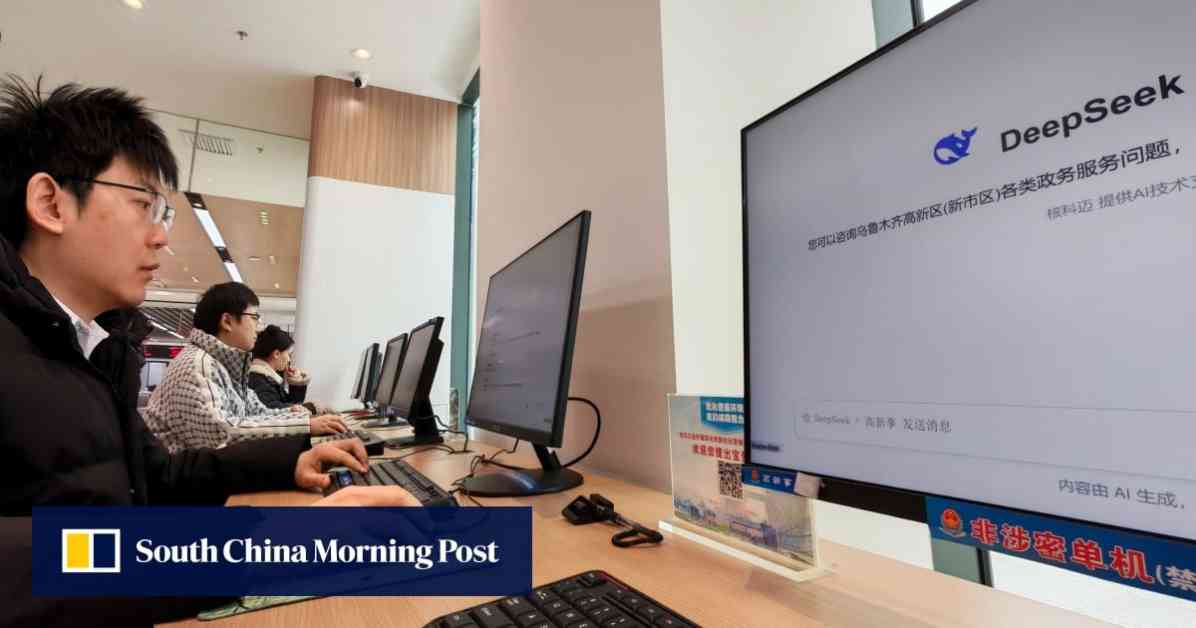Local governments in China are swiftly integrating artificial intelligence into their daily operations following the debut of the DeepSeek AI model, sparking a wave of reactions from the public. One of the early adopters, Futian district in Shenzhen, made headlines last week by unveiling 70 AI-powered units equipped with 11 different functions, such as document processing, investment project analysis, and task delegation across departments, all powered by the DeepSeek-R1 model.
DeepSeek, headquartered in Hangzhou, made waves in the tech world with the release of its AI reasoning model just a month ago. Noteworthy for being open source, cost-effective for training and operation, and user-friendly for Chinese users, it has emerged as a formidable rival to dominant global AI models. The unveiling of DeepSeek’s AI capabilities prompted US President Donald Trump to issue a cautionary statement, dubbing it a “wake-up call” for American technology. Conversely, Beijing lauded DeepSeek’s success as a testament to China’s innovation prowess amid ongoing chip export restrictions from the US and its allies.
Chinese state media wasted no time in extolling the virtues of DeepSeek as a crucial national asset in China’s quest for AI supremacy. Founder Liang Wenfeng’s recognition at a symposium hosted by President Xi Jinping, alongside other prominent entrepreneurs, underscored the government’s unwavering support for domestic innovation to bolster economic growth. President Xi has consistently emphasized the importance of harnessing big data and AI technologies at all government levels to enhance governance and public service delivery.
The Impact on Public Perception
As news of AI integration into civil services spreads, public sentiment remains divided on the implications of this technological shift. Some view it as a progressive step towards efficiency and modernization, while others express concerns about job displacement and potential privacy breaches. The rollout of AI-powered units in Futian district serves as a microcosm of these contrasting viewpoints, prompting a broader debate on the role of AI in governance.
In response to these apprehensions, experts in the field of AI emphasize the need for robust data protection measures and ethical guidelines to mitigate any risks associated with AI implementation. By prioritizing transparency, accountability, and inclusivity in AI development, governments can build public trust and ensure that AI technologies serve the collective good.
The Future of AI in Governance
Looking ahead, the integration of AI into civil services is poised to revolutionize traditional bureaucratic processes, streamlining decision-making, optimizing resource allocation, and enhancing citizen engagement. As AI technologies continue to evolve, policymakers face the challenge of balancing innovation with ethical considerations, ensuring that AI serves as a tool for social progress rather than a source of inequality.
By fostering collaboration between government, industry, and academia, countries can leverage AI’s transformative potential to address complex societal challenges and drive sustainable development. As China leads the way in AI innovation, the global community watches closely to see how these advancements will shape the future of governance and public service delivery.
In conclusion, the advent of AI in civil services heralds a new era of governance, marked by unprecedented efficiency, responsiveness, and accountability. As governments navigate this technological frontier, the key lies in harnessing AI’s power responsibly and ethically to build a more inclusive and equitable society.



























